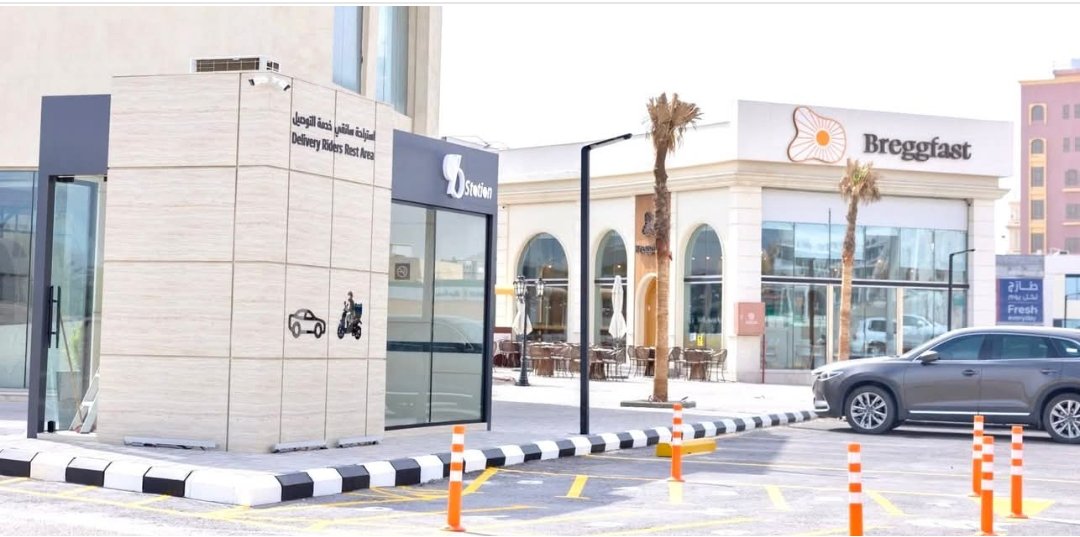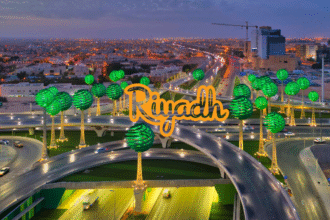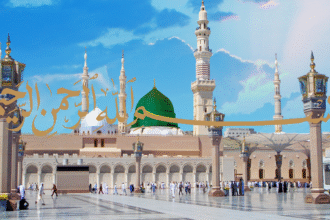The whole Arab world is hot and humid. In summer, the temperature rises to 56 degrees in some parts. You can cook an egg on that heat. Well, Saudi Arabia has done something worth applauding. They have introduced AC shelters for delivery workers. We all know how Arab countries are famous for their desert plains. But we often overlook how barren beauty impacts their climate and the challenges that come with it. Recently, Saudi Arabia has inaugurated its first air-conditioned rest station for delivery drivers.
It is in the city of Al Khobar. This step follows a footprint of what the UAE does for its labor class. This small, sleek building offers a shaded, cooled, and comfortable space. Where delivery workers can rest, recharge, and recover during their long, hectic shifts.
This may seem like something very small on the canvas of what Saudi Arab does to facilitate its labor class. It is indeed a tiny booth, barely the size of a small café. But imagine the level of comfort it provides to those who work in this heat. Delivery riders who carry food, medicine, and parcels often work 10–12 hours a day. This is heaven for them. The message is loud and clear. Through this step, Saudia reassures that they value their labour class as much as every other professional.
A Region Awakens to Worker Welfare
The Arab world is a big market for the labour class. Given the opportunities, people from several countries move there to support their families. These countries need to treat them well.
In recent years, the United Arab Emirates has been initiating such reforms. Dubai has introduced shaded rest areas, and they are even making new infrastructure that supports all travellers. These changes need years of planning and implementation. Now Saudi Arabia is following through. This is a clear message that Arab countries take their worker class seriously.
Why It Matters More Than It Seems
While Arab countries are progressing, their climate is very harsh. Doing a job there is not as easy as it seems. Especially for people who work outside. Also, the salaries are not much for these people. Introducing shaded areas and air-conditioned buildings for them is a great relief.
Most delivery riders come from developing countries. They already face a lot of mental stress. Also, they can keep on working sometimes without proper time to eat or rest. This initiative is a great comfort for them.
A Shift in Mindset
A clean air-conditioned rest station with cold water, seating, and a sense of safety, it’s not just a logistical upgrade. It’s a psychological one. It’s about giving dignity to labor. It’s a gesture to show that the Saudi kingdom values its workforce and will do everything in its power to protect and facilitate them. And perhaps most importantly, it sets a precedent.
Today, there is one rest station in Al Khobar. Tomorrow, it could be a national network of rest stops, hydration zones, mobile clinics, and even legal support centers for blue-collar workers. With this rest station, Saudi Arabia has taken a meaningful step in reminding the public: these workers aren’t invisible. They are essential.
A Blueprint for Other Gulf Nations
The economy of Gulf countries depends heavily on the workforce. Millions of migrant workers are the backbone of their countries. Though Dubai has done many things, Saudi Arabia’s entrance into this conversation is important.
They have a Vision 2030 to transform themselves socially and become more modern. This step could be a foundational example of how economic goals can align with social justice. The idea is simple. If you want a smart city, it must be a fair city. For a world-class infrastructure, you must offer world-class working conditions to those who build and maintain it. It’s more than comfort, it’s a necessity.
What Could Be Next?
This first rest station opens up exciting possibilities. Imagine if every major city in Saudi Arabia adopts this model. It can be a game changer. Picture an urban design plan that includes:
- Cool-down pods every 5 kilometers
- Free Wi-Fi zones for drivers to update routes or call home
- Mobile medical vans offering free checkups
- Worker-only cafeterias with subsidized meals
- Community centers for training and language classes
This isn’t an imaginary utopian. It’s totally doable. And with the right policy push, it can transform how we define public service infrastructure in the Gulf.
The Power of Small Buildings and Big Ideas
Sometimes, it’s not high skyscrapers or billion-dollar deals that define a nation’s moral character. Sometimes, it’s a small air-conditioned booth with a bench and a bottle of cold water. This step marks that KSA is progressing in the right direction.





